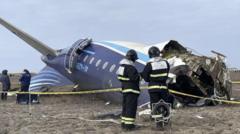The tragic crash of Flight J2-8243 raises significant questions about air safety and military actions in conflict zones.
Azerbaijan Airlines Flight J2-8243 Crash: Investigating a Tragic Incident

Azerbaijan Airlines Flight J2-8243 Crash: Investigating a Tragic Incident
38 lives lost as Azerbaijan Airlines flight crashes in Kazakhstan, with evidence suggesting Russian air-defence involvement.
On December 25, an Azerbaijan Airlines flight, designated J2-8243, tragically crashed in Kazakhstan, resulting in the loss of 38 lives. The flight was en route from Baku, Azerbaijan's capital, to Grozny, the Chechen capital in Russia, when it met a catastrophic fate amid unclear circumstances.
Reports indicate that as the flight approached Grozny, it encountered severe fog and poor visibility, prompting the pilot to attempt multiple landings. Survivors recounted hearing multiple explosions during the attempts, leading to critical damage to the aircraft. One survivor described a moment where the "aircraft's skin had blown out" following a violent impact, while a flight attendant recounted the panic that ensued after the strikes.
Further complicating the scenario, Azerbaijan's transport minister indicated that the flight experienced "external interference," raising concerns of missile damage from Russian air-defence systems amid ongoing military operations in the region. In the wake of the crash, Russia's authorities have suggested these military actions warranted a temporary closure of airspace around Grozny.
Following the explosion, the flight was diverted approximately 450 kilometers (280 miles) to Aktau airport in Kazakhstan. Despite attempts to land, the plane crashed some kilometers from the airport, igniting in a fireball on impact. Eyewitness footage captured the plane's catastrophic descent, with many survivors remarkable enough to emerge from the wreckage.
While initial claims pointed to collisions with birds, experts suggest that the aircraft may have been affected by electronic jamming before being struck by projectiles from Russian missile systems. Reports indicate that U.S. officials acknowledge early signs of Russian responsibility, yet Azerbaijan has refrained from directly accusing Russia, focusing instead on international inquiries for a thorough investigation.
Both government and aviation authorities are under scrutiny as the investigation unfolds, with suggestions for a collective probe by regional entities being rejected by Azerbaijan in favor of an independent inquiry. In the aftermath, several airlines have suspended flights to certain Russian destinations, highlighting ongoing tensions in the airspace associated with military conflicts.


















